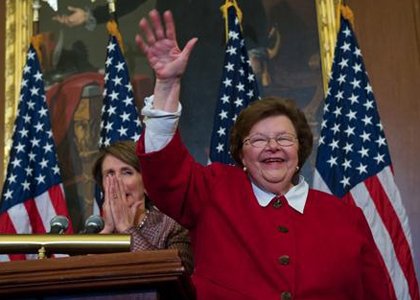United States Senator Barbara Mikulski (D-MD) has championed equal rights for all, equal pay for women and has successfully ended discrimination against women in health care. She also spearheaded a change in government regulations that previously forced elderly couples to spend all their assets and lose their homes before qualifying for help in paying for nursing homes.
She has also helped more than two million seniors retain their homes despite a rugged economy and persistent threats to retirement, social security and other benefits.
That Mikulski says she would prefer to spend the two years remaining in her term campaigning for Maryland residents rather than campaigning for herself comes as little surprise to those who know the 78-year-old Democrat who was first elected to the Senate in 1986.
“No problem is too big or too small,” Mikulski said, repeating a mantra that she has become legend for.
On Monday, March 2, 2015, Mikulski, who has served longer in Congress than any other woman in history, announced that she is retiring.
“This has been a hard decision to make,” she said, before calming any fears that she was retiring because of health issues. She also said she isn’t frustrated, that it was just time to move on.
Among her long list of accomplishments, Mikulski became the first woman to chair the Senate Appropriations Committee in 2012, and she now serves as the ranking Democratic member on the committee that controls federal spending.
“Her dedication to working with members on both sides of the aisle has earned her a great amount of respect in both the Appropriations Committee and the Senate,” said Alabama Republican Senator Richard Shelby.
Even President Barack Obama weighed in on the value Mikulski brought to Congress and he noted the respect she earned in Washington and around the nation.
“She’s a legendary senator, an institution whose legacy will span generations,” the president said in a news release. “Barbara has wielded her gavel and used her booming voice to advocate on behalf of paycheck fairness, childcare, health care, education, women’s rights and countless issues that have contributed to the strength of America’s families,” Obama said.
Political Science Professor Roy Meyers of the University of Maryland, Baltimore County told NPR that Mikulski’s legacy crossed party lines.
“Many of the women that came into the Senate and the House, regardless of whether they were Republicans or Democrats, really viewed her as a role model.” Meyers said, adding that the senator was “a ground-breaker in terms of making sure the voices of women legislators were taken seriously.”
Mikulski established the Office of Women’s Health and ultimately ended the exclusion of women in federally-funded research protocols on illnesses directly impacting women, which led to a historic study on hormone treatment for women and saving lives.
She helped to put an end to gender discrimination in health insurance during health care reform making sure that omen would no longer be charged 40 percent more for the same coverage as men and they’d no longer be denied coverage because they had chosen to have a C-section or were the victim of domestic violence.
Mikulski grew up in the Highlandtown neighborhood of East Baltimore where learned the values of hard work, neighbor helping neighbor and heartfelt patriotism, according to her official biography. She often watched her father open the family grocery store early so that local steelworkers could buy lunch before the morning shift.
Her first election was a successful run for Baltimore City Council in 1971, where she served for five years. In 1976, she ran for Congress and won, representing Maryland’s 3rd district for 10 years. In 1986, she ran for Senate and won, becoming the first Democratic woman Senator elected in her own right.
She was re–elected with large majorities in 1992, 1998, 2004 and 2010.
Although she has had a number of other accomplishments, Mikulski says among the things she wants to focus on before leaving office is to make sure women receive equal pay for equal work. She says that she also wants to make college affordable and wants to see an increase in the childcare tax deduction.
“Though I’m turning a new page, make no mistake,” she said. “We’re not writing the last chapter.”
